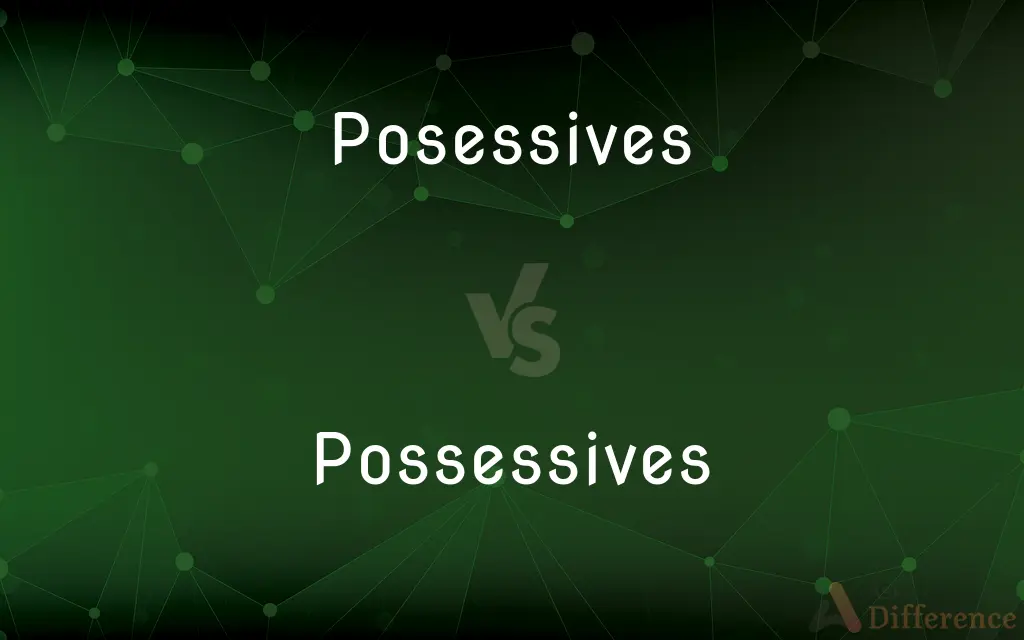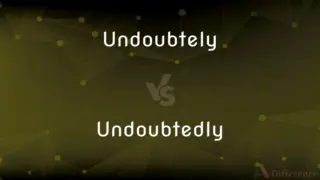Posessives vs. Possessives — Which is Correct Spelling?
Edited by Tayyaba Rehman — By Fiza Rafique — Updated on April 1, 2024
"Posessives" is an incorrect spelling. The right spelling is "Possessives," which denotes ownership or relationships in grammar.

Table of Contents
Which is correct: Posessives or Possessives
How to spell Possessives?

Posessives
Incorrect Spelling

Possessives
Correct Spelling
ADVERTISEMENT
Key Differences
Remember two 's' sets: "posSESSives."
Mnemonic: "Possess means to own, so 'Possessives' show ownership."
Think of "possession" and recognize the repeated 's.'
Connect "Possessives" with "ownership" which has two 's's.
Think of "possess" and add "-ives" to remember "Possessives."
ADVERTISEMENT
How Do You Spell Possessives Correctly?
Incorrect: Her essay was full of mistakes with posessives.
Correct: Her essay was full of mistakes with possessives.
Incorrect: Understanding posessives is crucial for good writing.
Correct: Understanding possessives is crucial for good writing.
Incorrect: The cat's toy shows it's posessives.
Correct: The cat's toy shows its possessives.
Incorrect: The teacher explained how to use posessives correctly.
Correct: The teacher explained how to use possessives correctly.
Possessives Definitions
They denote a relationship of belonging between one thing and another.
The player's determination was evident.
Possessives are formed using nouns and apostrophes.
Mary's book is on the table.
In English, Possessives are often used before nouns.
Tom's hat is red.
Possessives can be singular or plural based on the noun.
The children's playground was renovated.
Possessives indicate ownership in grammar.
The dog's tail wagged.
Of or relating to ownership or possession.
Having or manifesting a desire to control or dominate another, especially in order to limit that person's relationships with others
A possessive parent.
(Grammar) Of, relating to, or being a noun or pronoun case that indicates possession.
The possessive case.
A possessive form or construction.
Plural of possessive
Possessives Meaning in a Sentence
In English, possessives can show ownership or close relationships.
The teacher's advice helped me understand possessives better.
Understanding possessives helps in distinguishing between plural and singular forms.
It's important to use apostrophes correctly in possessives.
Learning possessives is essential for mastering English grammar.
The possessives case can also indicate a measure of time, like in "a day's work."
Possessives Idioms & Phrases
Possessives puzzle
The challenge of understanding and using possessive forms correctly in English.
For many English learners, the possessives puzzle can be quite tricky to solve.
Mastering possessives
Becoming proficient in the use and understanding of possessive forms.
Mastering possessives is a key step in improving your English grammar skills.
The rule of possessives
The grammatical rules that dictate how possessive forms are created and used.
The rule of possessives was the main focus of today's lesson in our English class.
Common Curiosities
Why is it called Possessives?
It denotes ownership or a relationship of belonging in grammar.
What is the verb form of Possessives?
The base verb is "possess."
What is the pronunciation of Possessives?
/pəˈsɛsɪvz/.
What is the plural form of Possessives?
Possessives.
What is the singular form of Possessives?
Possessive.
Which vowel is used before Possessives?
"A" as in "a possessive noun."
Which preposition is used with Possessives?
"Of" can express similar relationships, but "Possessives" typically use apostrophes.
Which conjunction is used with Possessives?
Any conjunction can be used, depending on the sentence.
Is Possessives a negative or positive word?
Neutral.
What is the root word of Possessives?
"Possess."
Is Possessives an abstract noun?
Yes, when referring to the grammatical concept.
Is Possessives a countable noun?
Yes, when referring to specific instances (e.g., "There are several possessives in that sentence").
Is the Possessives term a metaphor?
No, it's a grammatical term.
Is the word Possessives imperative?
No.
How many syllables are in Possessives?
3 syllables.
Is Possessives a noun or adjective?
Both. As a noun, it refers to the grammatical form. As an adjective, it describes a noun showing ownership.
Is Possessives a vowel or consonant?
"Possessives" is a word containing both vowels and consonants.
Is Possessives a collective noun?
No.
What is the opposite of Possessives?
There isn't a direct opposite, but "non-possessive" denotes the absence of ownership.
What is the first form of Possessives?
Possessive (either the adjective or singular noun form).
Is the word Possessives a gerund?
No.
What part of speech is Possessives?
Noun or Adjective.
Which determiner is used with Possessives?
"This," "that," "my," "our," depending on context.
What is the second form of Possessives?
There isn't a "second form" per se, but "Possessive's" indicates ownership of something belonging to "Possessive."
What is the third form of Possessives?
Possessives, denoting the plural or general concept.
Is Possessives an adverb?
No.
How do we divide Possessives into syllables?
pos-sess-ive.
What is a stressed syllable in Possessives?
The second syllable, "sses."
What is another term for Possessives?
Genitive.
Which article is used with Possessives?
Both "a" and "the" can be used depending on context.
Is the word “Possessives” a Direct object or an Indirect object?
It can be either, depending on sentence structure.
How is Possessives used in a sentence?
"The possessives in English can be tricky for non-native speakers."
Share Your Discovery

Previous Comparison
Undoubtely vs. Undoubtedly
Next Comparison
Angell vs. AngelAuthor Spotlight
Written by
Fiza RafiqueFiza Rafique is a skilled content writer at AskDifference.com, where she meticulously refines and enhances written pieces. Drawing from her vast editorial expertise, Fiza ensures clarity, accuracy, and precision in every article. Passionate about language, she continually seeks to elevate the quality of content for readers worldwide.
Edited by
Tayyaba RehmanTayyaba Rehman is a distinguished writer, currently serving as a primary contributor to askdifference.com. As a researcher in semantics and etymology, Tayyaba's passion for the complexity of languages and their distinctions has found a perfect home on the platform. Tayyaba delves into the intricacies of language, distinguishing between commonly confused words and phrases, thereby providing clarity for readers worldwide.


































